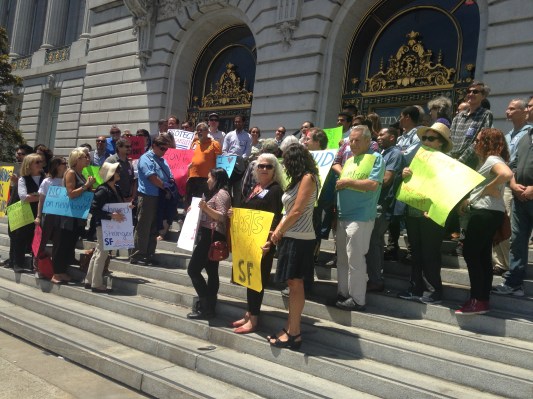A coalition of home owners and affordable housing activists submitted more than 15,000 signatures today for a ballot initiative in the November election that will more tightly regulate short-term rentals and Airbnb. In response, an organization financially backed by Airbnb called ‘San Francisco For Everyone’ held a rally on the steps of City Hall today urging voters to give the city more time to work out the existing regulations.
It is a fascinating collision of city’s political cultures — San Francisco’s historically very participatory (and litigious) approach to land-use and urban development against a venture-backed astro-turfing group representing the interests of a home-grown startup that is now a $25 billion company.
Backers of the ballot initiative say the existing regulation passed last fall doesn’t go far enough, and neither will changes proposed by Mayor Ed Lee and Supervisor Mark Farrell. The initiative proposes a law with a 75-day limit on hosting, quarterly data reports from platforms and an ability to go to civil court if the planning department does not react to complaints in time. Last week, Lee ordered the creation of a new enforcement office just as the city also sent violation letters to 15 hosts for allegedly turning 73 housing units into full-time short-term rentals. Lee and Farrell are trying to strengthen a short-term rental laws passed last year by putting a 120-day limit on the number of nights a host can rent out their home.
“The mayor’s planning department and every independent analyst has said the current law is unworkable and unenforceable unless you know the number of nights a unit is rented and unless you have the ability to go after hosting platforms that list unlisted units,” said Dale Carlson, who submitted the initiative today after collaborating with the San Francisco Tenants Union and San Francisco Apartment Association on it. “You can create this new little bureaucracy and call it whatever you like. But without those two pieces, the problem is going to proliferate.”
Airbnb just raised funding at a $25 billion valuation, which makes it more valuable than international hotel chains like Marriott and Starwood. To justify such a valuation, the company might need to grow its share of the lodging market from 1 percent to 10 percent. According to data, it released earlier this year, Airbnb had 9,692 listings in San Francisco in the year ending on April 15, 2015. That is about 2.6 percent of San Francisco’s 379,597 housing units.
The question at hand is how many of those units are by casual, occasional hosts and how many are from more commercial operators, who may be removing units from the permanent housing stock. Airbnb released a report last month, arguing that its business model combats wage stagnation and that the majority of its hosts rent out their primary residence for an average of 66 days a year.
At the ‘San Francisco For Everyone’ rally today, Airbnb backers carrying signs like ‘Sharing is Caring’ argued that the initiative would encourage neighbor-to-neighbor spying and would be an effective ban on the service.
One host, 70-year-old Simon Lee said that he had hosted some 200 guests in his home in the Sunset District. “It’s doing good things for the city of San Francisco,” he said. “I strongly support home-sharing in San Francisco.”
Another woman, Leah Pimentel of the Bayview neighborhood, said, “This measure doesn’t really support the building of community.” One of the speakers and organizers of today’s mid-day rally was Megan Abell, who also happens to be a regional field director for Airbnb.
But Carlson argued that Airbnb’s image of middle-class hosts conceals a small number of commercial operators, where most of the company’s profitability lies. A subpoena by the New York State Attorney General Eric Schneiderman last year found that 6 percent of the platform’s hosts generated 37 percent of the revenue from 2010 to 2014.
“If you want to be out there helping people renting out a extra room or pay their mortgages — if that’s what you’re claiming to be doing, then why do you allow all these other bad actors?” Carlson said. “Because that’s where they make their money.”
On Insideairbnb.com, a data site that scrapes Airbnb for hosting information, you can find San Francisco hosts like ‘Vic,’ who has 109 listings for hacker houses across the Bay Area and ‘Gatz,‘ who has 55 listings for Looky Homes also across the Bay Area. Airbnb and the policy makers backing the original November legislation authored by California state assembly member David Chiu have argued that it’s the city’s responsibility to enforce its own laws, not the company’s.
San Francisco city economist Ted Egan said that for every housing unit the city loses, it creates a net negative economic impact of $250,000 to $300,000 dollars even when tax revenues, host income and tourist spending is accounted for. Airbnb remits just over $1 million in tax revenue to the city on behalf of its hosts. Still, Egan’s report says that the 120-day cap should be conservative enough to protect the city’s housing stock.
